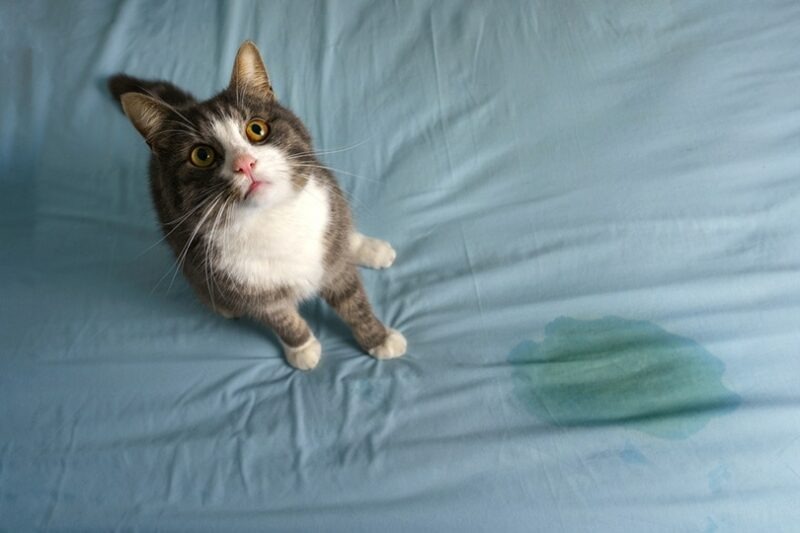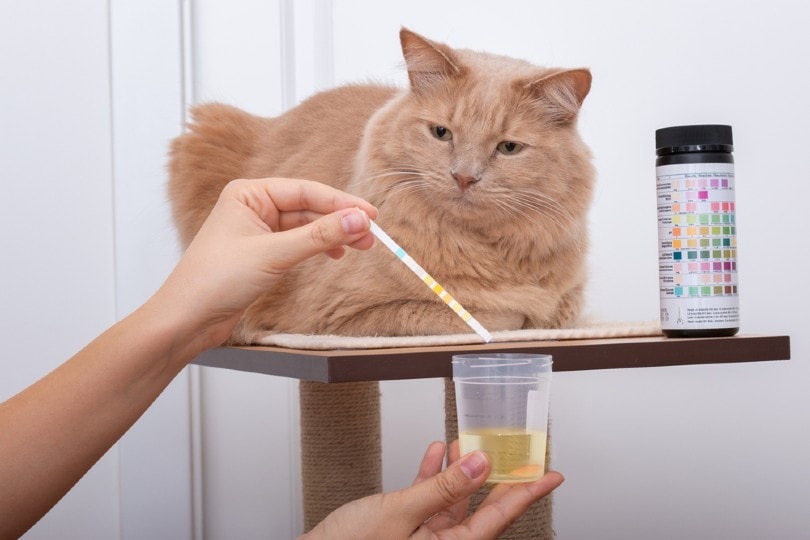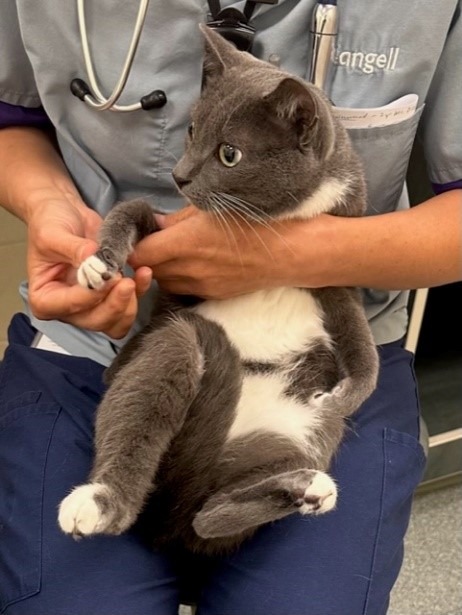-
Adopt
-
Veterinary Care
Services
Client Information
- What to Expect – Angell Boston
- Client Rights and Responsibilities
- Payments / Financial Assistance
- Pharmacy
- Client Policies
- Our Doctors
- Grief Support / Counseling
- Directions and Parking
- Helpful “How-to” Pet Care
Online Payments
Referrals
- Referral Forms/Contact
- Direct Connect
- Referring Veterinarian Portal
- Clinical Articles
- Partners in Care Newsletter
CE, Internships & Alumni Info
CE Seminar Schedule
Emergency: Boston
Emergency: Waltham
Poison Control Hotline
-
Programs & Resources
- Careers
-
Donate Now
Let’s face it: knowing if your cat is feeling under the weather is pretty tricky. But some signs should raise a red flag. If you’ve noticed your cat crying when she uses the litter box — or stops using her litter box entirely — something is not right or, more precisely, a urinary tract infection (UTI). Just like humans, all it takes is a little random bacteria to  find its way up a cat’s urethra — and the result can develop into an infection that’s just as painful and uncomfortable as it is for us.
find its way up a cat’s urethra — and the result can develop into an infection that’s just as painful and uncomfortable as it is for us.
We spoke with Dr. Kate O’Hara, BVetMed, an MSPCA-Angell General Medicine service veterinarian, about UTIs and cats, as well as the causes, symptoms, and treatments to help get your kitty back to feeling happy and healthy.
What are urinary tract infections in cats?
Dr. O’Hara: Urinary tract infections (UTIs) in cats are most often bacterial infections of a cat’s urinary tract. The urinary tract consists of the kidneys, the ureters (small tubes that lead from the kidneys to the bladder), the bladder, and the urethra (the tube that leads from the bladder to the outside). Although UTIs can involve any part of the urinary tract, when people talk about UTIs, they most commonly mean a lower urinary tract infection or a bladder infection.
What causes UTIs in cats?
Dr. O’Hara: The urinary tract is typically a sterile environment. The body has several natural defense mechanisms to keep bacteria out of the urinary tract and to prevent it from establishing there. In addition to the immune system, these natural defenses include one-way urine flow, a protective bladder wall lining, and the urine’s pH and other chemical properties. UTIs in cats occur when bacteria on the skin gain access to the lower urinary tract and can evade the natural defenses. This may happen if there is an overabundance of bacteria or the body’s natural defenses are compromised somehow.
Are there health conditions that predispose a cat to UTI?
Dr. O’Hara: UTIs are more common in female cats than male cats and, overall, are  pretty uncommon in cats younger than ten years old unless they have an underlying predisposing factor. Several health conditions will predispose cats to UTI. These include kidney disease, urinary stones, diabetes, anatomical abnormalities of the urinary tract, incontinence, or urinary tract tumors. Additionally, conditions that increase the amount of bacteria on the skin around the opening of the lower urinary tract will also increase a cat’s risk of UTI.
pretty uncommon in cats younger than ten years old unless they have an underlying predisposing factor. Several health conditions will predispose cats to UTI. These include kidney disease, urinary stones, diabetes, anatomical abnormalities of the urinary tract, incontinence, or urinary tract tumors. Additionally, conditions that increase the amount of bacteria on the skin around the opening of the lower urinary tract will also increase a cat’s risk of UTI.
A veterinarian will also want to look for one of these underlying health conditions if they diagnose a young or male cat with a UTI or if they are treating a cat with recurrent UTIs.
What are the most common UTI symptoms in cats? What are signs that owners can watch out for?
 Dr. O’Hara: UTIs cause inflammation and discomfort in the bladder. Clinical signs of a UTI reflect this and may include:
Dr. O’Hara: UTIs cause inflammation and discomfort in the bladder. Clinical signs of a UTI reflect this and may include:
- Urination outside the litter box (i.e., urgency)
- Small frequent urinations in multiple spots
- Straining
- Blood in the urine
It is important to note that conditions other than infection that lead to inflammation in the bladder can also cause these signs. Hence, your veterinarian needs to get an accurate diagnosis.
Because UTIs are often localized to the bladder, there are usually no signs of systemic illness (i.e., fever, lack of appetite, excessive thirst, etc.). However, these signs may develop if the infection ascends higher into the kidneys.
How does a veterinarian diagnose a UTI in a cat?
Dr. O’Hara: To diagnose a UTI, a veterinarian will submit a urine sample for urinalysis and urine culture with sensitivity. The best urine sample for this testing is collected using cystocentesis, a method where a sterile needle collects the urine directly from the bladder. A sample collected in this way will unlikely be contaminated by the environment.
and urine culture with sensitivity. The best urine sample for this testing is collected using cystocentesis, a method where a sterile needle collects the urine directly from the bladder. A sample collected in this way will unlikely be contaminated by the environment.
A urinalysis gives the veterinarian a lot of information, including whether bacteria or inflammatory cells are in the urine. Additional information from the urinalysis, such as urine concentration and pH, whether there are atypical cells in the urine, or whether there are crystals in the urine, is also very useful in assessing the health of the urinary tract.
The urine culture with sensitivity will determine what type of bacteria is growing in the urine and to which antibiotics it may be sensitive or resistant.
If a cat gets recurrent or persistent UTIs, the veterinarian will also recommend additional testing, such as a blood panel and imaging of the urinary tract, to look for an underlying cause.
What are some UTI treatments for cats?
Dr. O’Hara: Treatment for a bacterial UTI will be a course of systemic antibiotics. The antibiotic choice should ideally be based on the result of a urine culture with sensitivity.
How long the course of antibiotics should be can be controversial and will depend on several factors, including whether the cat has a simple or more complicated UTI. The International Society for Companion Animal Infectious Disease (ISCAID) determines guidelines for classifying UTIs and how to treat them to reduce antibiotic resistance.
How long does it take to clear up a UTI in a cat? What should an owner do to help their pet recover more quickly?
 Dr. O’Hara: Clinical symptoms of a UTI will typically start to improve within 48-72 hours of starting an appropriate antibiotic. Although the cat may start feeling better, an infection may not be fully cleared in this timeframe, so an owner should still complete the full course of antibiotics prescribed. In some cases, the veterinarian may recommend a follow-up urine culture after the treatment course to ensure the infection has cleared.
Dr. O’Hara: Clinical symptoms of a UTI will typically start to improve within 48-72 hours of starting an appropriate antibiotic. Although the cat may start feeling better, an infection may not be fully cleared in this timeframe, so an owner should still complete the full course of antibiotics prescribed. In some cases, the veterinarian may recommend a follow-up urine culture after the treatment course to ensure the infection has cleared.
To support the cat during recovery, an owner can also ensure that the cat continues eating regularly and staying hydrated.
Is there a way to prevent a cat from getting a UTI? Is there anything an owner can do to keep UTIs from recurring?
Dr. O’Hara: Preventing obesity may be one way an owner can help prevent UTIs in cats. Preventing obesity will allow the cat to groom itself normally and cause excessive skin folds around the urogenital tract. Both of these factors will lower the level of bacteria on the skin in that area. For cats that have trouble grooming themselves, owners can help by keeping the fur in this area clipped short and by using antiseptic wipes to keep the skin clean and dry.
Preventing obesity also lowers a cat’s risk of developing diabetes or other health conditions that may predispose them to infection.
Good litter box husbandry and keeping cats well-hydrated may also be beneficial.
Are there breeds of cats that are predisposed to UTIs?
Dr. O’Hara: All breeds of cats can get UTIs. Those who are more at risk of underlying predisposing health conditions (such as kidney disease, obesity, diabetes, or urinary stones) will also be more at risk for secondary UTIs.
* * * *
Preventive care is crucial for maintaining your pet’s overall health, do take a moment to schedule a wellness exam with your family veterinarian. If you don’t have a veterinarian or are looking for a new one, consider visiting Angell Animal Medical Center. We offer general medicine services in Boston, Waltham, and Danvers, providing you with the highest quality of care for your pet. Take a step towards ensuring your pet’s well-being this year and beyond by choosing the MSPCA-Angell.
More related information
Feline Inappropriate Urination



